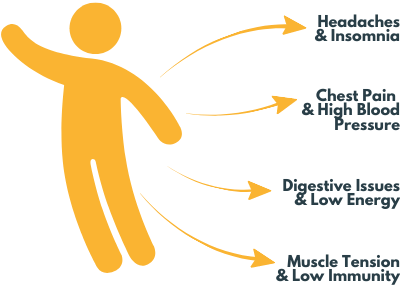Depression is a painful experience, and while we generally associate depression and anxiety with emotional distress, research has shown that they may also present with physical symptoms. It’s just as essential to be aware of the physical symptoms as it is to be aware of the emotional and behavioural symptoms.
Physical symptoms show that mental distress is quite real and may have a negative impact on our general health.

These are the most common physical symptoms of depression and anxiety:
- Muscle aches and back pain
- Chest pain
- Dizziness and shaking
- Jaw clenching or teeth grinding
- Sleep issues
- Weakness or fatigue
- Shortness of breath
- Increased heart rate and high blood pressure
- Sweating
- Fatigue and low energy
- Lowered pain tolerance
- Frequent infections and illness
- Dry mouth
- Headaches and migraines
- Blurred vision
- Stomach pain and discomfort
- Digestive problems and stomach pain
- Lowered libido
Physical symptoms of mental health problems indicates that mental health is a more frequent cause of absenteeism and decreased productivity than previously considered.
Awareness of both the behavioural and physical symptoms of mental health issues can help you to identify these issues and get the help that you need. Early intervention stops long-term suffering.
Although these symptoms can be symptoms of mental health concerns, they can also be presentations of other illnesses. Don’t hesitate to see your doctor if you are experiencing prolonged physical or mental health issues.
Let’s Talk About Mental Health
Workplace Mental Health Support Improves Employee Wellbeing.
Contact Us